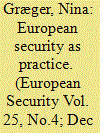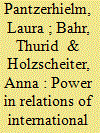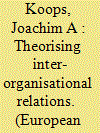|
|
|
Sort Order |
|
|
|
Items / Page
|
|
|
|
|
|
|
| Srl | Item |
| 1 |
ID:
142563


|
|
|
|
|
| Summary/Abstract |
This article provides a case study in the new and developing field of inter-organisational relations by looking at the position of the European Union (EU) within the Group of Eight (G8). It analyses the questions of why inter-organisational relations start, and how they develop over time. I argue that inter-organisational relations are determined by the dynamics within the international organisations that are involved: both the characteristics that define these organisations, as well as the preferences of their constituent parts. The G8-EU relation was a by-product of European integration resulting from the transfer of competences, but was initially thwarted by the strong and divided preferences within the EU. While the G8’s informality at first facilitated this internal division, it also enabled this relation to change over the following decades. This change cannot only be ascribed to rationalist and social-institutionalist factors but also testifies to a logic of path dependence.
|
|
|
|
|
|
|
|
|
|
|
|
|
|
|
|
| 2 |
ID:
148317


|
|
|
|
|
| Summary/Abstract |
European security is at a critical juncture and many have called for a more coherent and efficient response, involving both the EU and NATO. However, the primary tool for EU–NATO cooperation, “Berlin Plus”, has been stuck in a political quagmire since the mid-2000s, making a lot of scholars to conclude that this cooperation is obsolete and outdated. This article is challenging this view by analysing a range of informal but regular interaction patterns that have emerged. Using practice theory, it sheds new light on and explores how EU and NATO staff at all levels engage in informal practices on various sites in headquarters in Brussels and in field operations. A study of EU–NATO cooperation as practice focuses on the everyday, patterned production of security as well as what makes action possible, such as (tacit) practical knowledge and shared “background” knowledge (education, training, and experience). The article also discusses the extent to which shared repertoires of practice may evolve into loose communities of practice that cut across organisational and professional boundaries.
|
|
|
|
|
|
|
|
|
|
|
|
|
|
|
|
| 3 |
ID:
173403


|
|
|
|
|
| Summary/Abstract |
In recent years, scholarship on international organisations (IO) has devoted increasing attention to the relations in which IOs are embedded. In this article, we argue that the rationalist-institutionalist core of this scholarship has been marked by agentic, repressive understandings of power and we propose an alternative approach to power as productive in and of relations among IOs. To study productive power in IO relations, we develop a theoretical framework centred on the concept of ‘metagovernance norms’ as perceptions about the proper ‘governance of governance’ that are shared among IOs in a governance field. Drawing on discourse theory, we contend that metagovernance norms unfold productive power effects, as dominant notions of how to govern well and effectively (i) fix meanings, excluding alternative understandings and (ii) are inscribed into practices and institutions, hence reshaping inter-organisational relations over time. To illustrate our framework, we trace metagovernance norms in discourses among health IOs since the 1990s. We find a historical transformation from beliefs in the virtues of partnerships, pluralisation, and innovation, towards discursive articulations that emphasise harmonisation, order, and alignment. Moreover, we expose the productive power of metagovernance norms by showing how they were enacted through practices and institutions in the global health field.
|
|
|
|
|
|
|
|
|
|
|
|
|
|
|
|
| 4 |
ID:
154462


|
|
|
|
|
| Summary/Abstract |
This article explores the historical evolution of research on the “European Union (EU)–North Atlantic Treaty Organisation (NATO) relationship” since the 1950s and examines the numerous ways in which it has served as an important case study for applying and developing theory-guided and conceptual research on inter-organisational relations (IOR) in International Relations. After a dearth of policy-oriented research during the 1990s and early 2000s, a wide range of scholars have contributed to a “conceptual turn” in the study of EU–NATO during the last decade. This development, as this article will argue, not only signifies a stronger interest by scholars to understand the complex relationship between both organisations with the help of more theory-driven research, but also highlights that the EU–NATO relationship has become a “catalytic case study” in terms of inspiring conceptual experimentation and advancing efforts to theorise IOR more generally. The article provides for the first time a systematic stock-taking and analysis of the richness of concepts and theoretical debates related to EU–NATO relations research and offers scholars wider insights into the most promising approaches and analytical tools for understanding and theorising EU–NATO relations.
|
|
|
|
|
|
|
|
|
|
|
|
|
|
|
|
|
|
|
|
|